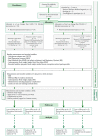TIMER: A Clinical Study of Energy Restriction in Women with Gestational Diabetes Mellitus
- PMID: 34371966
- PMCID: PMC8308500
- DOI: 10.3390/nu13072457
TIMER: A Clinical Study of Energy Restriction in Women with Gestational Diabetes Mellitus
Abstract
Medical nutrition therapy is an integral part of gestational diabetes mellitus (GDM) management; however, the prescription of optimal energy intake is often a difficult task due to the limited available evidence. The present pilot, feasibility, parallel, open-label and non-randomized study aimed to evaluate the effect of a very low energy diet (VLED, 1600 kcal/day), or a low energy diet (LED, 1800 kcal/day), with or without personalized exercise sessions, among women with GDM in singleton pregnancies. A total of 43 women were allocated to one of four interventions at GDM diagnosis: (1) VLED (n = 15), (2) VLED + exercise (n = 4), (3) LED (n = 16) or (4) LED + exercise (n = 8). Primary outcomes were gestational weight gain (GWG), infant birth weight, complications at delivery and a composite outcomes score. Secondary outcomes included type of delivery, prematurity, small- for-gestational-age (SGA) or large-for-gestational-age (LGA) infants, macrosomia, Apgar score, insulin use, depression, respiratory quotient (RQ), resting metabolic rate (RMR) and middle-upper arm circumference (MUAC). GWG differed between intervention groups (LED median: 12.0 kg; VLED: 5.9 kg). No differences were noted in the type of delivery, infant birth weight, composite score, prevalence of prematurity, depression, RQ, Apgar score, MUAC, or insulin use among the four groups. Regarding components of the composite score, most infants (88.4%) were appropriate-for-gestational age (AGA) and born at a gestational age of 37-42 weeks (95.3%). With respect to the mothers, 9.3% experienced complications at delivery, with the majority being allocated at the VLED + exercise arm (p < 0.03). The composite score was low (range 0-2.5) for all mother-infant pairs, indicating a "risk-free" pregnancy outcome. The results indicate that adherence to a LED or VLED induces similar maternal, infant and obstetrics outcomes.
Keywords: caloric intake; depression; diabetes mellitus; diet; gestational weight gain; lifestyle; low-calorie diet; obstetrical outcome; physical activity; pregnancy.
Conflict of interest statement
The authors declare no conflict of interest.
Figures
Similar articles
-
The impact of restricted gestational weight gain by dietary intervention on fetal growth in women with gestational diabetes mellitus.Diabetologia. 2018 Dec;61(12):2528-2538. doi: 10.1007/s00125-018-4736-6. Epub 2018 Sep 25. Diabetologia. 2018. PMID: 30255376
-
The association of insufficient gestational weight gain in women with gestational diabetes mellitus with adverse infant outcomes: A case-control study.Front Public Health. 2023 Feb 23;11:1054626. doi: 10.3389/fpubh.2023.1054626. eCollection 2023. Front Public Health. 2023. PMID: 36908424 Free PMC article.
-
The effect of weight management interventions that include a diet component on weight-related outcomes in pregnant and postpartum women: a systematic review protocol.JBI Database System Rev Implement Rep. 2015 Jan;13(1):88-98. doi: 10.11124/jbisrir-2015-1812. JBI Database System Rev Implement Rep. 2015. PMID: 26447010
-
Fetal biometry for guiding the medical management of women with gestational diabetes mellitus for improving maternal and perinatal health.Cochrane Database Syst Rev. 2019 Sep 3;9(9):CD012544. doi: 10.1002/14651858.CD012544.pub2. Cochrane Database Syst Rev. 2019. PMID: 31476798 Free PMC article.
-
Attenuation of maternal weight gain impacts infant birthweight: systematic review and meta-analysis.J Dev Orig Health Dis. 2019 Aug;10(4):387-405. doi: 10.1017/S2040174418000879. Epub 2018 Nov 9. J Dev Orig Health Dis. 2019. PMID: 30411697
Cited by
-
Effect of Exercise on the Resting Metabolic Rate and Substrate Utilization in Women with Gestational Diabetes Mellitus: Results of a Pilot Study.Metabolites. 2022 Oct 20;12(10):998. doi: 10.3390/metabo12100998. Metabolites. 2022. PMID: 36295900 Free PMC article.
-
Diet Quality and Nutritional Risk Based on the FIGO Nutrition Checklist among Greek Pregnant Women: A Cross-Sectional Routine Antenatal Care Study.Nutrients. 2023 Apr 22;15(9):2019. doi: 10.3390/nu15092019. Nutrients. 2023. PMID: 37432147 Free PMC article.
-
Recurrent gestational diabetes : Breaking the transgenerational cycle with lifestyle modification.Wien Klin Wochenschr. 2022 Nov;134(21-22):788-798. doi: 10.1007/s00508-022-02004-3. Epub 2022 Feb 11. Wien Klin Wochenschr. 2022. PMID: 35147773 Review.
-
Ketone Bodies in Diabetes Mellitus: Friend or Foe?Nutrients. 2023 Oct 16;15(20):4383. doi: 10.3390/nu15204383. Nutrients. 2023. PMID: 37892458 Free PMC article. Review.
-
Maternal and fetal outcomes in gestational diabetes mellitus: a narrative review of dietary interventions.Front Glob Womens Health. 2025 Feb 26;6:1510260. doi: 10.3389/fgwh.2025.1510260. eCollection 2025. Front Glob Womens Health. 2025. PMID: 40078500 Free PMC article. Review.
References
Publication types
MeSH terms
LinkOut - more resources
Full Text Sources
Miscellaneous


